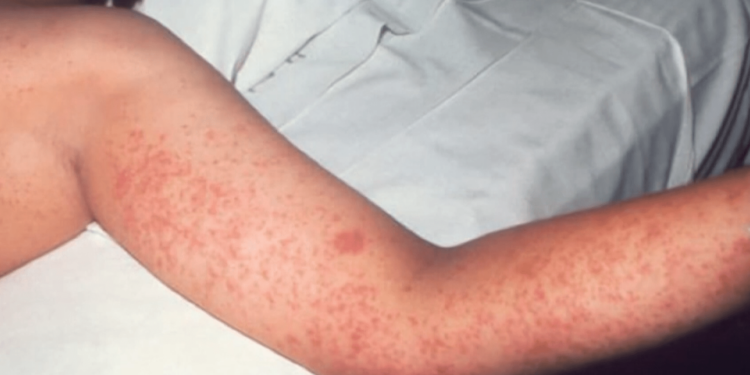IRON MOUNTAIN, Mich (WZMQ) – In the wake of a measles outbreak downstate, health officials are on high alert for a potential spread into Michigan’s Upper Peninsula. 3 cases have been reported in 2 downstate cities, Dearborn and Ann Arbor, with exposures occurring between February 27 and March 1. The Dickinson-Iron District Health Department & Western Upper Peninsula Medical Director, Dr. Robert Van Howe, warns of risks to those not vaccinated.
“Each person who has measles can spread it to 12-18 other people on average, if you’re in a situation with people that aren’t immune to it,” stated Dr. Van Howe.
Symptoms, according to Dr. Van Howe, who is also a pediatrician, include high fever, cough, runny nose, pink-eye-like symptoms, and a rash starting from the head. “Measles is extremely contagious,” said Dr. Van Howe, “so all it takes is someone visiting from an area where measles is going on to come here, and then they could give it to someone, and it’ll spread like wildfire. The measles usually presents with a high fever: like 103-104, bad cough, runny nose, goopy pink eye [-like symptoms], and that’s for about 3 days before the rash breaks out. The rash usually breaks out on the 4th day. It’ll start at the forehead, and then it spreads down the body,” informed Dr. Van Howe. “The problem is that they’re contagious from the very beginning, even before the rash,” he added.
An outbreak in Houghton County could result in 40-60 hospitalizations, with a mortality rate of 1-500, overwhelming the health system there and potentially hindering the ability to transport patients to other hospitals, Dr. Van Howe estimates.
“If measles were to come to Houghton County, we’d probably see 2-3 hundred cases within a couple of weeks,” remarked Dr. Van Howe.
Complications from measles can be severe, with a risk of subacute sclerosing panencephalitis for 1 in 1000 individuals, detailed Dr. Van Howe.
“We find that probably 20% of them will be hospitalized. And about 30% or so will develop pneumonia. About 1-3 in 1000 will die as a result of the infection. There’s also about 1 in 1000 who after they get the infection, 7 -10 years later, they start having some kind of brain damage from the original measles,” he remarked. Dr. Van Howe warned, “It is delayed, and those people uniformly die of it within a year of developing symptoms,” adding, “It’s pretty nasty.”
Unvaccinated individuals can receive the MMR vaccine within 72 hours of exposure to minimize risks, but should still be monitored for symptoms. Immunocompromised individuals can receive immunoglobulin treatment within 6 days of exposure.
In special cases, children as young as 6 months can be vaccinated for measles, and egg allergies are no longer contraindicated to get the MMR vaccine. However, pregnant or soon-to-be pregnant women should avoid the vaccine.
Anyone who suspects they’ve been exposed should contact their healthcare provider immediately.










